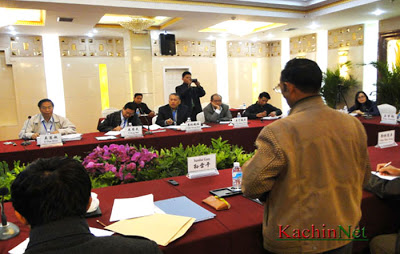At the same time Kachin Independence Organization (KIO) leaders met with central government representatives for peace talks in the Chinese border city of Ruili, soldiers stationed at Lajayang were shelling KIO positions.
 According to several eye witnesses on the ground, the launched attacks started at 1 pm on Monday. These recent attacks and many other similar offences conducted during the previous peace talks did little to alleviate the KIO’s suspicions that the government is unwilling or unable to control their military.
According to several eye witnesses on the ground, the launched attacks started at 1 pm on Monday. These recent attacks and many other similar offences conducted during the previous peace talks did little to alleviate the KIO’s suspicions that the government is unwilling or unable to control their military.
No major breakthroughs came during this recent meeting, but both sides agreed to meet again, possibly by the end of the month. However for the first time since the 17-year ceasefire unraveled on June 9, 2011, talks were formally observed by several Chinese government officials. China’s Foreign Ministry Spokesperson Hua Chunying was reported by Chinese state-controlled media as saying that the govt was pleased both sides could sit down together for peace discussions.
"China would like congratulate the two parties on the achievements that have been made on significant issues, including cease-fire and peace talks, and hopes they will fulfill their commitments and maintain contact," Hua told a press briefing in Beijing.”
KIO’s Laiza headquarters was recently under siege by government troops firing mortar, military helicopters and jet planes. Several bombs landed on Chinese soil in December and January. Civilians were also killed during the offensive. Now that government troops control several strategic hills surrounding Laiza, fear has spread among the thousands of displaced sheltering in the area. Many have fled into other parts of the state or over the Chinese border to stay with relatives.
China typically has taken a neutral role since the June conflict began. The presence of Chinese officials at the meeting suggest that the government is growing concerned about the conflict further spiraling out of control.



